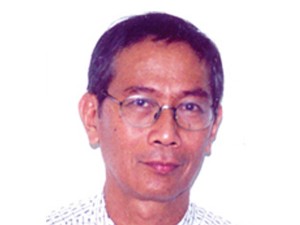UP economist bats for gov’t intervention against strong peso
MANILA, Philippines—University of the Philippines economist and national scientist Raul Fabella has called for collective action against a sharp peso appreciation against the US dollar, which he warned could otherwise spoil the country’s economic momentum.
In a position paper carried by the Foundation for Economic Freedom, Fabella supported the “more assertive attitude towards the value of the peso,” which was part of the resolution submitted by the Philippine Chamber of Commerce and Industries (PCCI) to Malacañang in a recent business forum. He urged Filipinos “not to leave it to the bureaucrats” and push for government intervention to keep the exchange rate from appreciating past 42 to the dollar.
As of last week, the peso closed at 41.18 against the dollar, gaining from 43.928 at end-2011.
Fabella recalled that in 1994, when a group of economists including himself, Noel de Dios, Benjamin Diokno, Cayetano Paderanga and Calixto Chikiamko called for the deliberate weakening of the peso—a cause carried in a speech by the then Senate President Edgardo Angara at the first plenary session of the 1994 National Economic Summit—this group was “treated worse than lepers.” He noted that this was after the People’s Republic of China (PRC) devalued its currency by 40 percent in early 1994.
The yuan then stayed at about 8.30 per US dollar for 10 years despite ever larger trade surplus and howls of protest from the West. “One did not need atomic physics to glean that PRC’s move would devastate Philippine manufacturing and employment. This was a plea for economic survival,” he said.
Fabella said the CB governor then responded to his group’s call with the defiant “over my dead body” stance while the prescription to businessmen’s complaints of high domestic interest rate (to support the overvalued peso) then was to instead borrow in dollars.
“It was a counsel for disaster. Borrow with vengeance they did, especially the banks. After all, with appreciation a one-way bet, you get low interest rate and a sure appreciation gain!…And this omen of an impending debacle was hailed a success! In other words, the Philippine economy got poison disguised as medicine. Two years later, the Asian Financial Crisis, the bitter harvest of private over-borrowing and asset bubbles, wiped out the gains slowly built up the last five years. The CB’s strong peso policy had aborted the Ramos growth momentum,” he said.
Such “rebuff of common sense,” Fabella said, was a source of personal great sadness for him. The Filipino people then failed a massive collective action test by letting “ignorance” among central bankers and among the business community short-change the country’s future, the economist said.
“Had we moved the exchange rate as proposed, there would not have been excessive private foreign borrowing and the Asian Crisis would have spared our shores. The banks would have remained whole and the Ramos growth inertia would have continued into the next decade. Instead, we experienced a decade of painful curettage to sweep away the poisonous residues of that abortion. Our romance with sado-masochism marched on. Such is the power of the CB: it can shatter a budding future. In this case, the strong peso was the sledgehammer,” Fabella said.
And that was not the first time that the CB officiated in the abortion of a potential breakout in the post-EDSA era, Fabella said, noting that the sledgehammer in the first was the interest rate cure administered through the high-yielding Jobo Bills that shrank the economy to fit the overvalued peso.
At present, Fabella said the economic situation is promising with the signs all pointing in the right direction. However, Fabella added, “the same abortive sledgehammer of sharply rising peso” is posing a threat.
“Will we overcome the collective action challenge this time—now that the players and the economic realities have changed, now that there is a new and more open dispensation in the BSP [Bangko Sentral ng Pilipinas], now that even such sworn enemies as the PCCI has switched lanes, now that overseas Filipino worker remittance is the country’s lifeblood, now that BPO [business process outsourcing] is the sunshine industry and the big conglomerates have dollar earning assets, now that the old global monetary consensus has become tired and misguided, now that the challenge—keep the exchange rate from dipping below P42/1$—is much simpler than in earlier times?” he said.
For its part, the BSP has slashed key interest rates by 100 basis points this year to temper the peso’s sharp appreciation.















